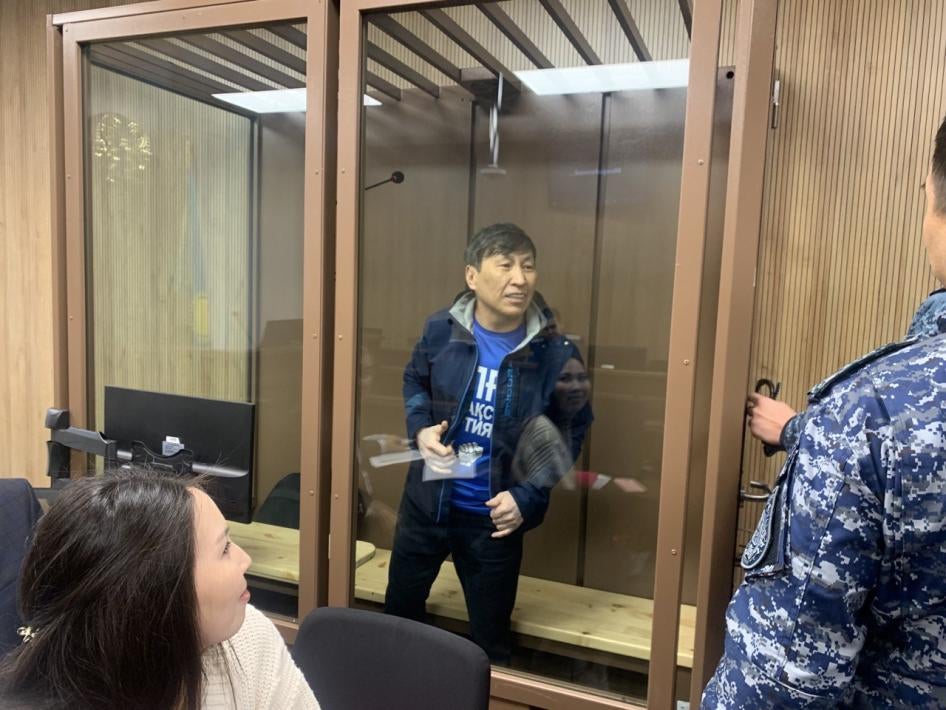(Berlin, November 9, 2023) – The politically motivated prosecution of an outspoken critic of the Kazakhstan government for alleged membership in a banned “extremist” organization violates his rights to freedom of expression, association, and assembly, Human Rights Watch said today.
In an October 30, 2023, preliminary hearing in Astana, Kazakhstan’s capital, the court closed the trial to observers and the media after two witnesses, who gave testimony against the critic, Marat Zhylanbaev, and whose identities the court did not disclose, alleged that they were facing threats.
“Zhylanbaev shouldn’t be on trial, much less a closed one, for engaging in peaceful political opposition,” said Mihra Rittmann, senior Central Asia researcher at Human Rights Watch. “The sum total of Zhylanbaev’s so-called wrongdoing is publicly but peacefully advocating for a political alternative to Kazakhstan’s authoritarian government, and he should be released.”
Zhylanbaev, 60, is a government critic and head of an unregistered opposition party, Alga, Kazakhstan! (Forward, Kazakhstan!), which has tried unsuccessfully to register with the Justice Ministry 16 times in the last year and a half.
In March, Zhylanbaev was barred from competing as an independent candidate in parliamentary elections after authorities accused him of “early campaigning” because of a social media post in which he appealed for funds to pay the candidate registration fee.
On March 17, Zhylanbaev and over a dozen other activists gathered outside the building of the European Union Delegation to Kazakhstan, calling on Kazakh authorities to release political prisoners, agree to an international investigation into January 2022 anti-government protests that began over an increase in fuel prices and in which at least 238 people were killed, and register Alga Kazakhstan! as an official political party. The protesters also said that Western countries should sanction Kazakh officials for helping Russia evade sanctions.
Police arrested Zhylanbaev on May 3. Later that day, an Astana court sentenced him to 20 days of administrative arrest for participating in an unsanctioned protest on March 17.
Instead of releasing Zhylanbaev after he served his 20-day sentence, police charged him with “financing extremist activities” and “participating in a banned extremist organization,” crimes that carry a maximum 12-year prison sentence. Police searched Zhylanbaev’s home and on May 25, a court sanctioned his arrest. His trial began with a preliminary hearing on October 30.
In the indictment, a copy of which Human Rights Watch has on file, authorities present as evidence of Zhylanbaev’s crimes his participation in unsanctioned protests and allegedly carrying out “instructions” from members of the Democratic Choice of Kazakhstan (DVK), an opposition group founded and led by exiled banker and opposition figure Mukhtar Ablyazov. The group has been banned in Kazakhstan by court order and designated as “extremist.”
Kazakh authorities also claim in the indictment that two wire transfers Zhylanbaev made in February 2023—in the amounts of 500,000 Tenge (about US$1,075) and 707,000 Tenge (about US$1,520)—constitute evidence of financing “extremist” activities because they were made to people that are “supporters” of DVK. The indictment cites no other evidence of Zhylanbaev financing “extremism.”
Zhylanbaev’s lawyer, Meyirzhan Doskaraev, told Human Rights Watch that his client made those transfers to support the campaigns of independent candidates in the March 2023 parliamentary elections and that the money was used to pay candidate registration fees. Neither recipient is, or ever was, a member of DVK, he said.
In recent years, Kazakh authorities have repeatedly attempted to stifle Zhylanbaev’s activism, detaining him multiple times for holding or attempting to participate in unsanctioned protests. In November 2022, Zhylanbaev and four others were sentenced to 15 days of administrative arrest after holding a rally on the eve of a European Parliament delegation visit to Kazakhstan. In July 2022, the authorities detained Zhylanbaev multiple times for handing out Alga Kazakhstan! leaflets, and courts fined him over 306,000 Tenge (about US$660) for violating the laws on public associations.
Zhylanbaev and Doskaraev have contested the court’s decision to close his trial. Zhylanbaev apparently appeared at a hearing on November 1 with his mouth sewn shut. The hearing was postponed as a result and he later removed the stitches. His lawyer told Human Rights Watch that a motion he filed against the judge’s decision to close the trial is pending before the court.
In comments to the media before the trial was closed, Zhylanbaev said: “I will fight to the end, even if they give me a life sentence. I want people to know and fight for their rights.”
Article 14 of the International Covenant on Civil and Political Rights, to which Kazakhstan is a party, stipulates that “everyone shall be entitled to a fair and public hearing in the determination of any criminal charge against them.”
The court’s decision to close proceedings, based solely on the unsubstantiated allegations of two unidentified witnesses who gave testimony against Zhylanbaev, constitutes overreach, suggests the court’s real motivation is to preclude any scrutiny of an unjust process, and should be reversed, Human Rights Watch said.
“Not only is Zhylanbaev being arbitrarily prosecuted by an authoritarian government for exercising his rights to free speech, peaceful protest, and freedom of association, but the authorities are doubling down by violating his fair trial rights,” Rittmann said. “He should be released immediately and the charges against him should be dropped.”








